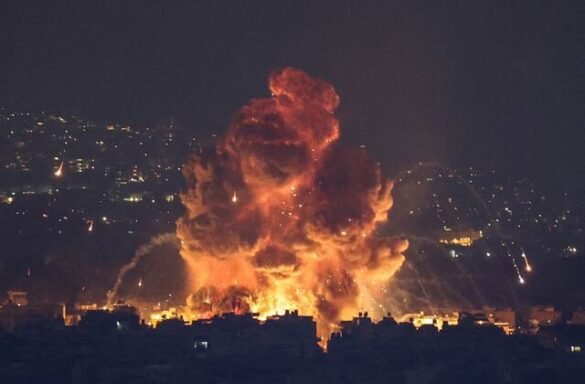Lebanon is in turmoil as Israel vows to destroy Hezbollah’s financial sites, escalating tensions in the region. Israeli airstrikes have targeted areas in Beirut and southern Lebanon, including the Al-Qard Al-Hassan association, a bank accused of funding Hezbollah. This comes as part of Israel’s intensified military campaign against the group, which it considers a major security threat.
The Israeli military has made clear its intentions to dismantle Hezbollah’s financial networks, which it says are integral to funding the group’s activities. The airstrikes in Beirut’s Dahieh district, southern Lebanon, and the Bekaa Valley have shaken the country, as the Israel Defense Forces (IDF) issued warnings to residents to evacuate areas near potential targets.
Intensified Airstrikes Targeting Financial Infrastructure
The Israeli Defense Forces confirmed that the strikes were aimed at disrupting the financial infrastructure that supports Hezbollah. According to the IDF, Hezbollah has long relied on civilian institutions like banks and charities to fund its operations. The Al-Qard Al-Hassan bank, which Israel claims is used to funnel Iranian money to Hezbollah, has been a primary target. The bank has over 30 branches across Lebanon, many in densely populated urban areas.
In southern Beirut, massive explosions were reported in the Dahieh district, a known Hezbollah stronghold. Additionally, strikes were reported near the Rafic Hariri International Airport and in the Bekaa Valley. The Lebanese state news agency (NNA) reported heavy damage, but there are no confirmed reports on casualties at this time. As Israel vows to destroy Hezbollah’s financial sites, fears of civilian casualties and widespread damage grow.
Hezbollah Retaliates with Rocket Fire
Amid these developments, Hezbollah has escalated its attacks on Israel. Over the past 24 hours, the group has launched dozens of rockets targeting Israeli military positions in northern Israel. The IDF confirmed that its air force had responded by targeting a Hezbollah command center and a weapons facility in Beirut. The military also claimed that measures were taken to minimize civilian casualties, but Hezbollah has accused Israel of indiscriminately targeting civilian areas.
Warnings from the IDF
In a statement, IDF spokesman Rear Adm Daniel Hagari warned civilians to stay clear of Hezbollah-affiliated sites. “We will strike several targets in the coming hours and additional targets throughout the night,” he said. He also mentioned that Israel would reveal Hezbollah’s use of civilian institutions, including non-governmental organizations (NGOs), as fronts for terrorist financing in the coming days.
The IDF has issued warnings to 25 areas in Lebanon, including 14 districts in the capital, Beirut. These warnings have caused mass evacuations as Israel vows to destroy Hezbollah’s financial sites. The IDF stressed that these operations aim to cripple the group’s capacity to launch attacks and maintain its military infrastructure.
Regional and International Reactions
Lebanon’s response has been swift. Officials in the country have condemned the strikes, calling them violations of Lebanese sovereignty. The Lebanese army reported that three of its soldiers were killed when an Israeli airstrike hit a military vehicle in Nabatieh, southern Lebanon. The army has historically stayed neutral in clashes between Hezbollah and Israel but has lost several soldiers since the escalation began last month.
The United Nations Interim Force in Lebanon (UNIFIL) also criticized Israel, accusing the IDF of destroying UN observation towers in southern Lebanon. In a statement, UNIFIL said, “Breaching a UN position and damaging UN assets is a flagrant violation of international law and Security Council resolution 1701.”
Growing Concerns of a Larger Conflict
As Israel vows to destroy Hezbollah’s financial sites, concerns about a broader conflict in the region have intensified. Hezbollah’s rocket attacks on Israel come in solidarity with Hamas, as both militant groups are backed by Iran. Israeli officials have emphasized that their strikes are part of a defensive effort to neutralize threats posed by Hezbollah’s military and financial infrastructure. However, Lebanese officials estimate that over 2,400 people have died in the country due to the ongoing conflict, with 59 casualties reported on the Israeli side.
With no immediate signs of de-escalation, the situation in Lebanon remains precarious. The destruction of financial infrastructure may cripple Hezbollah’s operational capacity, but it also risks plunging Lebanon into deeper economic instability.
As Israel vows to destroy Hezbollah’s financial sites, the international community is watching closely, with many urging both sides to exercise restraint to prevent further loss of life. However, with both Hezbollah and Israel showing no signs of backing down, the prospects for peace remain uncertain in the coming days.
Conclusion
Lebanon’s current crisis highlights the deep-rooted tensions between Israel and Hezbollah, as the financial war escalates into direct military confrontations. With Israel vowing to destroy Hezbollah’s financial sites, the conflict risks further destabilizing the region. Both sides have ramped up their attacks, leaving civilians to bear the brunt of the violence, while international efforts to mediate the situation remain tenuous at best.
Stay connected to know more on arcnews.online for global news like Lebanon in Flames as Israel Vows to Destroy Hezbollah’s Financial Sites. For videos updates visit our YouTube. Do subscribe to Arcnews to get latest updates directly in your mail box.
Have A Great Day.


